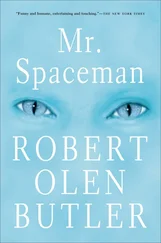“Can I help you?”
“I don’t know.”
“This is a funeral home.”
But see how dense she can be sometimes? What the fuck am I supposed to do about that?
“I know that,” Bob says.
She looks at him closely. She uncocks her head. She unpurses her lips, which she has repursed after stating the dumbshit obvious.
“Do you know someone here?” she asks.
Even with Calvin inside his brain, he is still Bob. That’s good. So he remembers. “Bob Quinlan,” he says.
This makes the woman smile. “Bob?”
“Yes.”
“I see. Where do you know him?”
“From Vietnam,” he says.
And something enters her. That look vanishes. Her eyes soften. “You’re a veteran,” she says, lifting up the word as if she should have known all along.
“Yes,” Bob says.
“Please wait,” she says.
She moves past him. He turns and watches her step to the inner doors.
She pauses before going in. “I’ll find him for you,” she says. “What’s your name?”
“Bob.”
And she changes again. Her face crimps up like that’s impossible, the name’s already taken. “Bob,” she says.
“Bob,” he says.
“Why don’t you wait here, Bob,” she says. “I’ll get Robert.”
She pushes through one of the doors and it swings shut.
He’s clearly not wanted in there. Too fucking bad.
Peggy pauses. Takes in the room. She was afraid of a visitation space this big. Afraid Bill would look unloved. But there are people. Dozens. He looks loved. If he’s nearby, hovering around before finally departing, he’ll see.
She has let the man in the hallway slide to the side of her mind. He’s probably homeless. He has the clothes, the whiff. But he’s a veteran. Of her son’s war. She looks to the doorway to her food. She should make the man a plate of food. From this angle she sees the beginning of her special row of warmers, a glimpse of Darla moving, out of sight now, serving Peggy’s dishes to Bill’s mourners. This is good.
She should find Robert for the veteran. Is Robert helping this man? She scans the crowd, ending at the far wall, the casket. She sees Robert there, talking to a couple. She moves off toward him, thinking, Bob. You’ve never been Bob.
And Bob steps through the doors into the visitation room. The woman has just passed by, not noticing him. Just as well. She’s moving briskly. She would have him stand around waiting on her like a bum at the back door.
He turns.
He follows her.
But more slowly. Taking in all the people as he goes. Look at them. Hats and ties and rouged cheeks and jowls and stubble and crimson lips and scarfs and sweaters and throats and hands, it’s that simple, boy, like feathers and fur and claws and hooves, like jungle jackets and rucksacks and pith helmets and VC pajamas, like white faces and black faces and yellow faces, this is what you learned there, all these are the same, people and their bodies and their uniforms and their skin, all of them are a zip of lead or a burst of flame or a tumble of shrapnel away from dead. Or a round of.45 Auto from the Glock in your pocket. You are a walking, talking, swinging dick of a reminder that it’s all just a wisp of smoke that the least little puff of air will blow away, and all the politics and all the ideas and all the scheming and raping and robbing and conquering, all the grunting and raving and wailing and weeping by every last one of these creatures is for nothing, because just that simple thing in your pocket there, boy, if you hold it steady and you aim it true, can turn any one of these poor motherfuckers into maggots and bones.
“Oh my God,” Peggy says, close enough now to recognize the other man, who is turning to her voice. “Jimmy,” she says. “Oh Jimmy.”
She rushes and she throws open her arms and Jimmy expected this moment if he came, if he stayed, and he decides to set aside all the years of his mother’s loyal-wife silence so that he can go through these motions. He opens his arms too and he takes her up and she embraces him. He looks at Heather, who is smiling the same smile he’s seen in quiet moments over coffee in their three breakfasts as a couple — even as Peggy looks at Heather thinking, I have another granddaughter and I didn’t even know she exists —and Jimmy looks at Robert, expecting from his brother a mutual lift of the eyebrows over this other difficult, shared parent. But Robert is beginning to turn his face away, to look into the room.
And as he draws near, Bob understands. You see what we’ve learned? What I gave my life to learn? At every moment, no matter who we are, we are all of us on the brink of being fucked. Nothing to save you from that. Nothing you can do. There it is. I am hugging you close now, my son.
And Robert sees Bob. Half a dozen strides away.
Their eyes lock.
Bob stops.
They look at each other.
Bob lifts his right hand, moves it up to his chest, and then reaches inside his coat. He pauses. For a moment Robert thinks Bob is feeling his heart. Is he in pain? But Bob’s hand is moving again, emerging.
A pistol, in profile against his chest, moving now, turning, the barrel coming round, and Robert is moving too, pushing forward in chest and shoulders sensing in them the placement of mother and brother and brother’s lover and of Bob and the vector between and Robert steps and the muzzle appears now and Robert steps again veering right, lunging between Bob and the others, the muzzle stopping, steadying, and Robert stops and squares and centers his chest on the killing black hole at the tip of the pistol.
“Bob,” he says.
They wait for a single breath.
And Bob understands.
He lifts the pistol and puts the barrel in his mouth and he holds his father close and he pulls the trigger.
Robert slips into the bed and pulls the covers to his chest. Only his table lamp is lit. Darla is in the bathroom. The door is closed and a thin fluorescent line shows at its base. The water is running. And then it stops. Not a sound from where he knows his wife to be. Not in this moment, not in the next. His limbs quicken. They would have him jump from the bed, rush to her. But now he hears some small sound. Unidentifiable. Perhaps a bottle-click on porcelain. Something. It is enough. The electric clock whines softly from her nightstand. He did not lose her. He did not lose any of them. Except for Bob.
It’s been a week.
Bob has appeared each night but one in a dream. His eyes are oddly warm and wide upon Robert even as the back of his head explodes. And each night Robert has awakened in a thrash of regret: I stopped to take a bullet when I should have lunged onward to take your gun. Last night, for the first time, Bob did not come to him.
Robert has not dreamt at all of his father. Or he has utterly forgotten him before waking. After all, he and his brother, side by side, watched the box that held the old man vanish into the earth.
But he is keenly aware: One dead man still lives.
In the bathroom Darla has cleaned her face and she stares at its nakedness and thinks, I am old. She closes her eyes. She saw nothing of the event itself, arriving in the doorway after the gunshot, Robert rushing to her while all around him the crowd surged backward, breaking apart, wailing. Robert took her in his arms, spun her into the buffet room, shielded her from the sight, as witnesses said he shielded his brother and his mother from the gun.
She can still feel his arms upon her.
She will ask Robert to turn out his light before she enters the bedroom. They have held each other every night since, but silently and inertly and only for a few minutes. She opens her eyes. She cannot bear to see herself. She looks away. Her lipstick sits on the cosmetics shelf beside the sink. She reaches out, puts her hand on it, hesitates, picks it up.
Читать дальше












